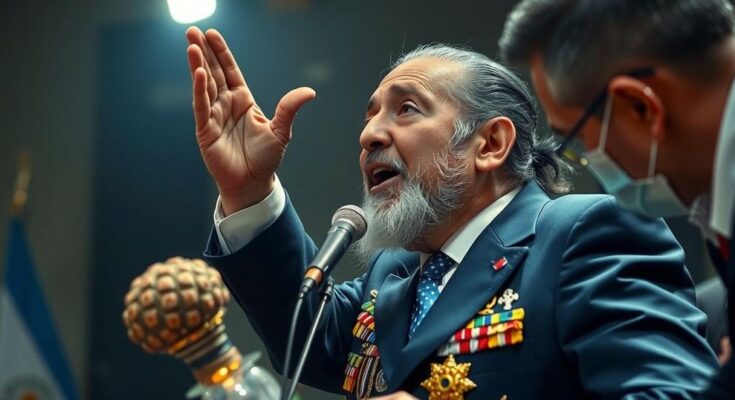Yamandú Orsi won Uruguay’s presidential election, leading the return of the Broad Front party. With 49.8 percent of the votes against Álvaro Delgado’s 45.9 percent, Orsi plans to unite the nation while addressing issues like poverty and crime. His approach reflects continuity with past successful leftist policies, symbolizing a significant electoral shift as he prepares to take office in March 2025.
In a significant electoral shift for Uruguay, leftist candidate Yamandú Orsi has emerged victorious in a tightly contested runoff election to become the country’s next president. Orsi’s triumph signifies a revival of the Broad Front party, which previously held power for 15 years before the rise of the center-right National Party in 2019. The former history teacher, aged 57, secured 49.8 percent of the votes, surpassing Álvaro Delgado, his opponent and the successor of the outgoing President Luis Lacalle Pou, who garnered 45.9 percent. Voter turnout was exceptionally high at nearly 90 percent, underscoring Uruguay’s commitment to compulsory voting laws.
Upon learning of his victory, Orsi committed to fostering unity in Uruguay after a divisive campaign. His win follows a period of governance characterized by significant socioeconomic improvements, including a dramatic decrease in poverty rates during the Broad Front’s previous administration. Notable former President José ‘Pepe’ Mujica’s progressive reforms from 2010 to 2015 paved the way for advancements in social policy, embodying a model for successful left-wing governance in Latin America. Orsi promised continuity in this tradition, emphasizing the need for dialogue and inclusivity within the nation.
Orsi is poised to commence his presidency on March 1, 2025, as he addresses critical issues such as the rising childhood poverty rate of 25 percent and increasing organized crime activities. His campaign, highlighting revitalization of agriculture and tax incentives for investment, reflects a balanced approach that combines welfare aspirations with market-friendly policies reminiscent of Mujica’s legacy. With the leadership transition underway, Orsi faces the challenge of reconciling differing political sentiments within the electorate, as stated, “These people will also have to help build a better country. We need them too.”
The political landscape had shifted significantly since Delgado’s party was entrenched in power, and analysts suggest that his defeat was partially due to an ineffective campaign that lacked a compelling vision and relied heavily on fear-based messaging. As Uruguay prepares for a new chapter under President-elect Orsi, the emphasis will be on harnessing collaborative efforts across the political spectrum to navigate the socio-economic challenges ahead.
Yamandú Orsi’s election as president represents a pivotal moment in Uruguayan politics, as it marks the return of the Broad Front to governance after a five-year hiatus. The Broad Front previously held power for 15 consecutive years, significantly impacting Uruguay’s socio-economic landscape. During their last tenure, the government achieved substantial progress in poverty reduction, with the World Bank reporting a drop in poverty rates from 39.9 percent to approximately 4.6 percent between 2005 and 2014. Orsi’s victory also reflects a broader trend of leftist and opposition candidates gaining traction in global elections, signifying shifting political tides in various regions. With a commitment to progressive values and social reforms, Orsi aims to continue the legacy set forth by former President José Mujica, known for his groundbreaking policies in areas such as LGBTQ rights and marijuana legalization.
In conclusion, Yamandú Orsi’s election as Uruguay’s president heralds a new era marked by a leftist resurgence and a commitment to social progress. His win signifies a return of the Broad Front, capable of addressing past achievements while confronting contemporary challenges such as crime and poverty. Moving forward, Orsi’s approach of promoting unity, dialogue, and resolution across diverse political views will be essential in fostering a more integrated and prosperous society.
Original Source: www.newsweek.com




